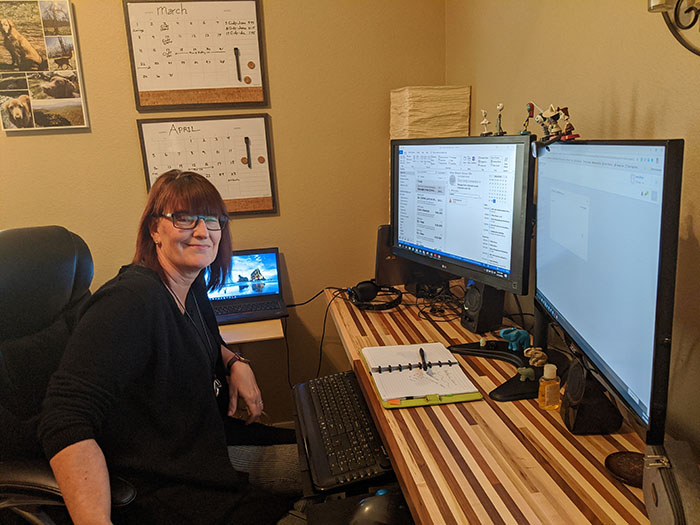
By Mike Kilen
GCU News Bureau
Kathy Britton woke up feeling ill. Her husband woke up feeling as if he hadn’t slept at all.
Britton started to fear that she might have COVID-19 but had to remind herself that she is prone to spring sinus infections. She had to remind her husband that in these stressful times stress anxiety emerges, even in sleep.
Such is life in America as people face fear and anxiety while isolated at home during the pandemic.
Many are experiencing vicarious trauma, said Britton, a trauma therapist by training and Chair of Behavioral Health and Counseling in the College of Humanities and Social Sciences at Grand Canyon University.
“Vicarious trauma occurs when the individual is not the direct victim of a traumatic experience, but they know someone who is the immediate victim,” Britton said.
They fear they may be next, similar to the days after the 9/11 terrorist attack in 2001.
“There is a feeling it could happen to us,” she said on Tuesday, when Arizona residents were told to stay at home and some national experts projected at least 100,000 American deaths.
When 9/11 occurred, the majority of Americans experienced some vicarious trauma, and research shows that their sense of reality and safety was challenged on that day.
“This pandemic is a slower-acting process than 9/11, and the effects are not as direct,” Britton said. “There have been many that have been slow to accept the reality of the situation, as well. Denial is reasonable when the human brain is challenged with the unbelievable.”
Britton even acknowledged her own level of denial because Arizona faced a different reality than virus hot spots such as New York City – at least until she heard stories of the suffering there on National Public Radio.
“Everyone thinks they are immune in a weird way, but none of us are,” she said. “We know people who have lost jobs – many of my students have lost jobs – and that’s a reality. Those things add to the stress.”
Many different emotions can emerge as the pandemic progresses.
We may feel hopeless and powerless during a crisis we can’t control.
“There is so much about the virus we don’t know,” Britton said. “I wash my hands, wear a mask and don’t go out, but what about the mailman?”
We may feel anxiety or anger, consuming media sources throughout the day, constantly monitoring the rising statistics or reading about who is to blame politically.
“We may have a quick temper and get more snappy or sensitive. A person can say something benign and we take it seriously,” she said.
They all can lead to increasing anxiety levels that manifest themselves in many ways: racing thoughts, feeling exhausted, not caring about anything, stomach and digestive problems, muscle twitches, being easily startled, losing appetite, eating too much, being distracted and have problems focusing.
She noticed the latter last week. A dozen of her students didn’t understand an assignment, an abnormally high number for the task.
“In normal times it is clear, but put the brain under pressure and your cognitive resources go down,” she said. “It’s harder to pay attention. You are not going to be able to be that student who waits until 11 the night before to crank out a paper, even if you normally do that, because your cognitive resources will be challenged.”
Recognizing these responses is a good step toward employing methods to prevent anxiety during an virus outbreak.
“Schedules and traditions are important, especially if you are working at home,” Britton said. “Take a shower and dress like you are going into the office before you sit in front of your computer.”
Britton recommends budgeting your consumption of the types of media in your life: “A Disney film is much better than a movie called 'Pandemic.'”
Also, take care of your physical self by eating healthy, drinking water, getting enough rest and exercise, and avoiding excess caffeine or alcohol.
“Don’t have the same level of expectations of your productivity,” she adds. “Take it easy on demands on yourself and teammates. And fight isolation by thinking outside the box to connect with others.”
She saw on Facebook that a group of stay-at-home mothers maintained their social group by pulling their vehicles into a parking lot to have morning coffee, together but a safe distance apart.
Britton joined an online game night of Apples to Apples to help another couple entertain their 10-year-old and maintain social connections.
“Even those reticent to partake will be forced to interact through technology and normalize that kind of sociability,” she said. “We get energy from interacting with each other. It’s almost like the food we need from our mothers. We can’t give that up.”
It’s important to know you will feel sadness, anxiety and possibly depression, which is normal during a crisis, but “have patience and grace for yourself.”
You could start your day by journaling, joining online yoga or practicing meditation and prayer with online applications Calm, Insight, Headspace and The Free Mindfulness Project.
Also look to the Christian community, she says, for our “communal psyche,” which reminds us that fear and divisions aren’t important.
“What’s important is that we live through this and keep people alive,” she said.
Grand Canyon University senior writer Mike Kilen can be reached at [email protected] or at 602-639-6764.



































































